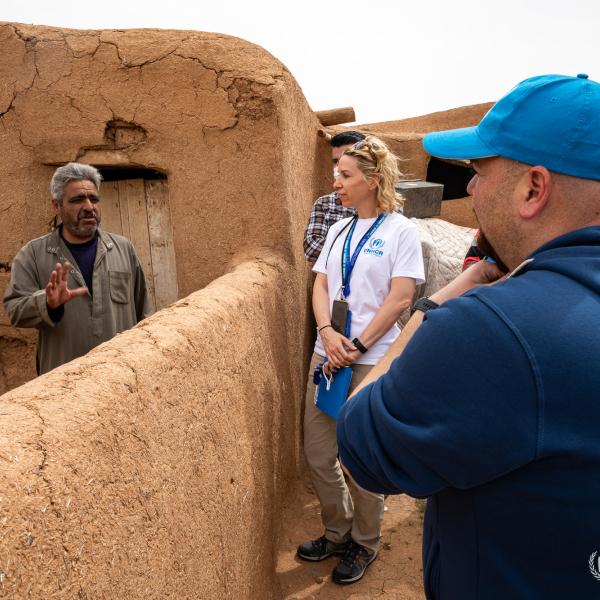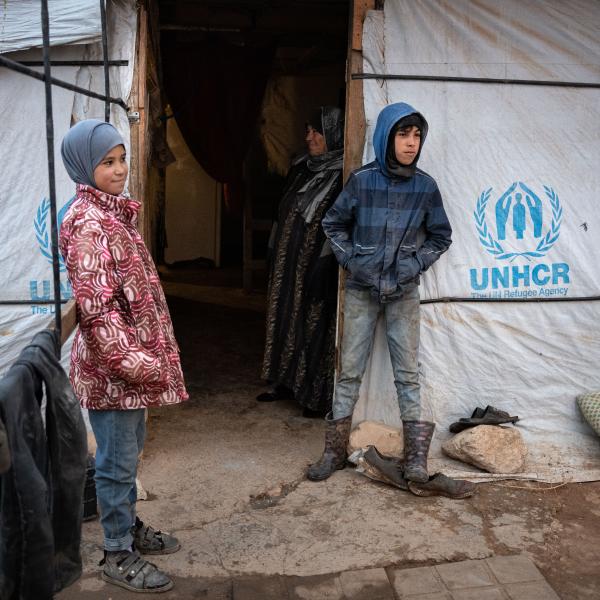The crisis in Syria has now entered its 14th year and remains one of the largest displacement crises in the world, with millions of people in need of humanitarian assistance inside Syria and in neighbouring countries. To shed light on the evolving situation and ongoing support efforts, we spoke with Stefanie Gross, Senior Protection Coordinator with UNHCR, the UN Refugee Agency, in January 2025. Stefanie discussed with us the challenges faced by people in Syria today as well as by refugees from Syria hosted in neighbouring countries, and how the Swiss community can support people affected by violence, conflict and war.

Who is Stefanie Gross, long-time humanitarian?
Stefanie Gross has been working with UNHCR since 2008, dedicating her career to supporting displaced people globally. Stefanie has been working on the Syria crisis since its outbreak in 2011, including inside Syria. She is currently based in UNHCH’s Regional Bureau in Jordan, responsible for coordinating protection-related activities in the Middle East and North Africa.
UNHCR and Syria
UNHCR's operational engagement in Syria started in the early 1990s, initially to support the country in receiving and supporting refugees from Iraq and other countries in and outside the region. With the outbreak of the crisis in Syria in 2011, UNHCR stepped up its presence and efforts – it now has a country office in Damascus and seven field offices throughout the country.
What is happening in Syria?
The humanitarian crisis in Syria remains one of the most severe in the world today. The country has been ravaged by conflict for over a decade, and the situation has been further aggravated by the devastating earthquakes in 2023 as well as crises in neighbouring countries and regions. The economy is in ruins, with much of the civilian infrastructure destroyed or damaged. More than half of the population remains displaced while around 90 percent live below the poverty line – a staggering 17 million people are in dire need of humanitarian assistance.
Stefanie highlights the conditions on the ground: "The people in Syria really lack everything. This starts with shelter, electricity, food, access to essential services such as schools and healthcare, and opportunities to earn a living because there are simply no jobs left." The needs are increasing across all sectors, while funding has been declining for many years.

UNHCR's work and impact inside Syria
UNHCR's work inside Syria is multifaceted, focusing on shelter, material assistance, and protection. UNHCR works closely with partners, providing support directly and through over 100 community centres located throughout Syria. UNHCR’s activities benefit refugee and internally displaced returnees, internally displaced persons and host communities, and refugees and asylum-seekers of other nationalities, with a focus on the most vulnerable – such as women at risk, children, elderly people, and people with disabilities.
UNHCR provides legal protection. Stefanie explains:
“We offer legal advice for refugees and returnees, including information about various legal matters, referral of individual cases to lawyers, and representation before authorities. This ranges from registering births and marriages to helping people reclaim their houses or property after their return.”
UNHCR also provides material assistance such as plastic sheeting, mattresses and blankets, kitchen utensils, and winter jackets. UNHCR supports the provision of shelter and restoring of housing and public infrastructure and also supports livelihoods projects.
Stefanie recalls the transformation of villages where UNHCR restored schools, bakeries, civil registries or health facilities: "When you return to a village after a few months, you see a place that may have looked like a ghost town suddenly lively again. People are resuming their lives, and you see a pull factor when services are available again, attracting others to return and settle there." Stefanie also recalls "an old woman in a village near Aleppo. Her children had fled, and she lived alone in a damaged house with plastic sheets taped over the holes in the walls. We provided her with doors and windows, so she was protected from the cold and felt safe again”. Stefanie also remembers women who benefited from training programs, enabling them to start small businesses.
“One woman opened a small shop selling children's clothes, and another sold homemade food. These small initiatives make a significant difference in their lives, helping them achieve independence and reduce their reliance on humanitarian aid.”
Why is supporting Syria critical now?
Donor support remains critical for UNHCR to continue so support Syrians inside Syria and in neigbouring host countries. Although the situation has changed with the fall of the former Government of Syria, the crisis is not over. Now is the time to sustain and increase funding for Syria, to ensure the supplying for the population, and to give those refugees or internally displaced persons who are considering returning to Syria or their places of origin the hope and perspective to be able to rebuild their lives in a sustainable manner.
The Swiss community plays a significant role in this regard. Stefanie expresses her gratitude:
“On behalf of UNHCR, I would like to thank the Swiss people for their incredible support. Switzerland has been very generous, and the solidarity among the Swiss with refugees is remarkable.”
She emphasizes the importance of maintaining this support. “For 65 Swiss francs, you can buy five mattresses for a family of five. For 150 Swiss francs, a family can survive for six weeks and cover their basic needs. These small amounts have an immediate and significant impact in the lives of individuals and families.”
As the Syrian crisis continues, it is vital for the international community, including the Swiss people, to remain engaged and supportive. Stefanie emphasises that everybody can contribute in many ways. “Everybody can do something. It starts with small private donations, but there are many other ways to get involved, such as accompanying refugees to appointments with authorities, tutoring children, or teaching the local language. You can keep the conversion on the situation in Syria going, with your friends or your family, and make sure that the millions of people in the region who need humanitarian aid are not forgotten.”
The Syrian crisis remains one of the largest and most complex humanitarian emergencies in the world. Through the dedicated efforts of UNHCR and the support of donors, including the Swiss community, there is hope for the millions of Syrians affected by the conflict. Stefanie’s experiences with the Syrian people highlight their resilience and the critical importance of continued solidarity and support. UNHCR’s work is changing lives, from being able to open a small business to fixing a roof to stay warm in winter.
Together, we can make a difference in the lives of those who need it most.